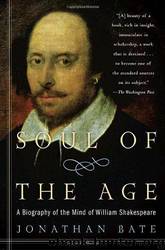Soul of the Age: A Biography of the Mind of William Shakespeare by Jonathan Bate

Author:Jonathan Bate [Bate, Jonathan]
Language: eng
Format: epub, mobi
Tags: Biography, Cultural History, Britain
ISBN: 9781400062065
Publisher: Random House
Published: 2009-01-01T15:00:00+00:00
The first published account of the trials of Essex and his associates, written in their immediate wake by Francis Bacon, is explicit about Meyrick's purported motive in procuring the performance: “So earnest he was to satisfy his eyes with the sight of that Tragedy, which he thought soon after his Lord should bring from the Stage to the State, but that God turned it upon their own heads.”
The case of Sir Gelly Meyrick is the first instance on record of a person being executed for commissioning the performance of a Shakespeare play. It was also a minor injustice, though one that has gone unnoticed by most commentators. Meyrick was not the man who “procured” or “bespoke” the revival of the old play of Richard II. So who did bespeak it, and with what intention, and why did the prosecutors—Mr. Secretary Sir Robert Cecil, Attorney General Sir Edward Coke, and his junior counsel Francis Bacon—wish to pin the commission on Meyrick? Why, for that matter, did they consider something so frivolous as a stage play worth invoking in a treason trial?
Historians sometimes find it valuable to play the game of counterfactuals, of “what if?” What if, like Henry Bullingbrook in the play, the earl of Essex had garnered support in the city? If he had then marched on the court and provoked a bloodbath in which the queen's person had been threatened? Because the rebellion proved so farcically ineffective, Elizabeth and her counselors were able to show wide clemency. A handful of ringleaders were executed as an example, but most of Essex's followers got away with, at worst, brief imprisonment and a fine. Had the threat been more serious, the response would have been more draconian. The performance of the play would then have been pursued further. One can imagine the line of questioning. Were not a majority of the ringleaders present? Blunt, Meyrick, Cuffe, Davies? Did the tragedy enacted at the Globe not bear striking resemblance to a treasonous book dedicated to Essex that had already provoked extreme measures, Sir John Hayward's History of King Henry IV? At this point, the author of the play would surely have been interrogated. It would have been discovered that though he was now the servant of the unimpeachably loyal lord chamberlain, Lord Hunsdon, his printed poems had been dedicated to none other than Essex's right-hand man, the earl of Southampton. Henry Brooke, Lord Cobham, a leading figure in the anti-Essex faction, might have chipped in with the information that this same filthy play-maker had written a so-called stage history full of gross insult toward his revered ancestor, the Lollard martyr Sir John Oldcastle. Shakespeare had been forced to change the name to Falstaff.
A few years before Essex's act of rash rebellion, the theaters had been closed down and the playwright Ben Jonson imprisoned on the far lesser provocation of some few seditious lines in a play called The Isle of Dogs. Surely in this case, Cecil would have argued, the Globe must be
Download
Soul of the Age: A Biography of the Mind of William Shakespeare by Jonathan Bate.mobi
This site does not store any files on its server. We only index and link to content provided by other sites. Please contact the content providers to delete copyright contents if any and email us, we'll remove relevant links or contents immediately.
Still Me by Jojo Moyes(11253)
On the Yard (New York Review Books Classics) by Braly Malcolm(5525)
A Year in the Merde by Stephen Clarke(5417)
Eleanor Oliphant Is Completely Fine by Gail Honeyman(5275)
The Bookshop by Penelope Fitzgerald(3844)
How Music Works by David Byrne(3261)
Surprise Me by Kinsella Sophie(3109)
Pharaoh by Wilbur Smith(2987)
Why I Write by George Orwell(2945)
A Column of Fire by Ken Follett(2607)
Churchill by Paul Johnson(2578)
The Beach by Alex Garland(2559)
The Songlines by Bruce Chatwin(2551)
Aubrey–Maturin 02 - [1803-04] - Post Captain by Patrick O'Brian(2305)
Heartless by Mary Balogh(2258)
Elizabeth by Philippa Jones(2199)
Hitler by Ian Kershaw(2194)
Life of Elizabeth I by Alison Weir(2079)
Harry Potter and the Cursed Child by J. K. Rowling & John Tiffany & Jack Thorne(2061)
